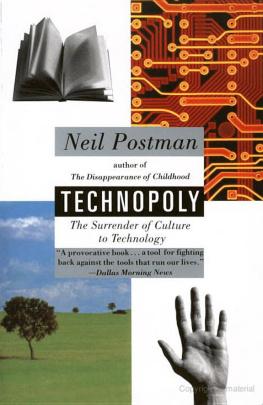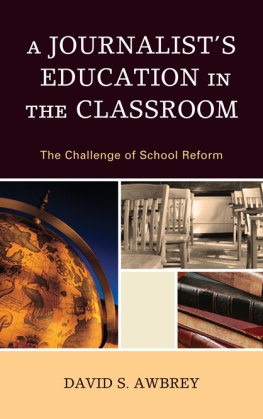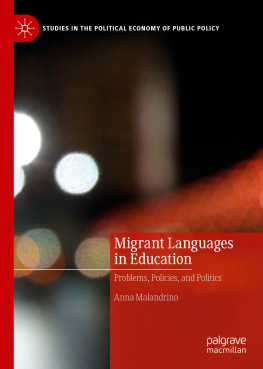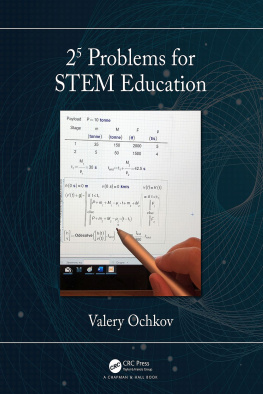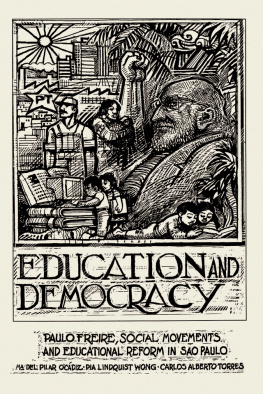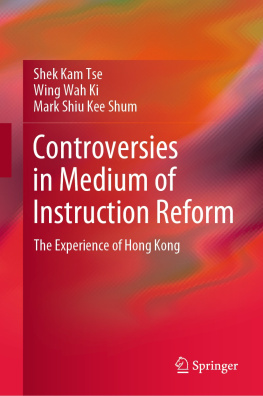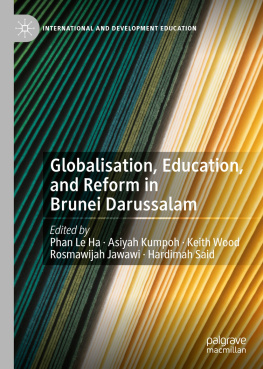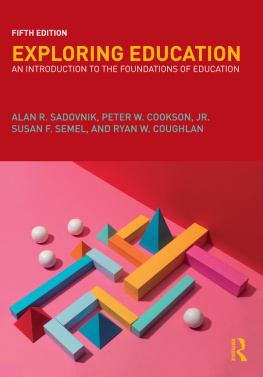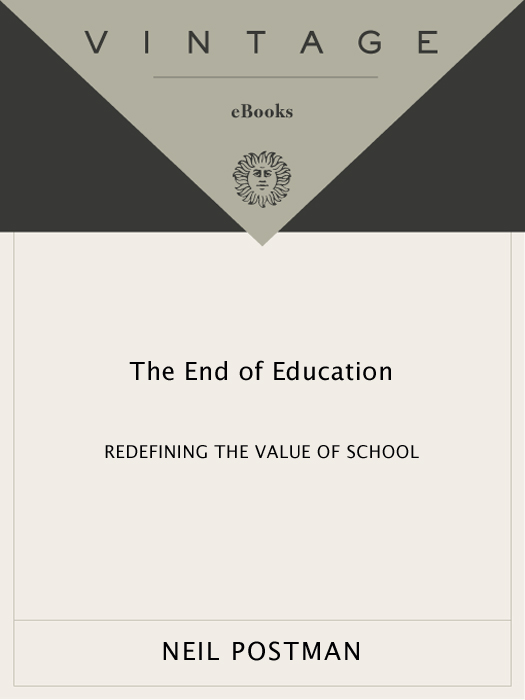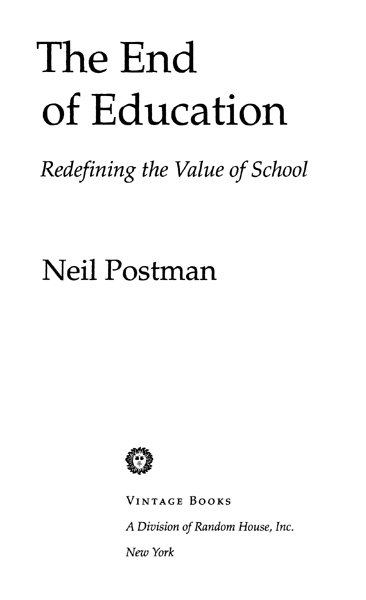Neil Postman
The End of Education
Neil Postman was University Professor and Chair of the Department of Culture and Communication at New York University. Among his twenty books are studies of childhood (The Disappearance of Childhood), public discourse (Amusing Ourselves to Death), education (Teaching as a Subversive Activity), and the impact of technology (Technopoly). He died in 2003.
Also byNeil Postman
Building a Bridge to the 18th Century
Technopoly
Conscientious Objections
Teaching as a Subversive Activity
(with Charles Weingartner)
Crazy Talk, Stupid Talk
Teaching as a Conserving Activity
The Disappearance of Childhood
Amusing Ourselves to Death
FIRST VINTAGE BOOKS EDITION, NOVEMBER 1996
Copyright 1995 by Neil Postman
All rights reserved under International and Pan-American Copyright Conventions. Published in the United States by Vintage Books, a division of Random House, Inc., New York, and simultaneously in Canada by Random House of Canada Limited, Toronto. Originally published in hardcover by Alfred A. Knopf, Inc., New York, in 1995.
The Library of Congress has catalogued the Knopf edition as follows:
Postman, Neil.
The end of education: redefining the value of school / Neil
Postman.1st ed.
p. cm.
eISBN: 978-0-307-79720-9
1. EducationUnited States. 2. Educational changeUnited States. 3. EducationUnited StatesAims and objectives. I.
Title.
LA 217.2. P 67 1995
370.973dc20 94-46605
Random House Web address:
http://www.randomhouse.com/
v3.1
To Alyssa and Claire
Contents
Preface
T he last book I wrote entirely on the subject of education was published in 1979. I return to the subject now, not because the education world has suffered from my absence, but because I have. I began my career as an elementary school teacher and have not for a single moment abandoned the idea that many of our most vexing and painful social problems could be ameliorated if we knew how to school our young. You may conclude from this that I am a romantic, but not, I think, a fool. I know that education is not the same thing as schooling, and that, in fact, not much of our education takes place in school. Schooling may be a subversive or a conserving activity, but it is certainly a circumscribed one. It has a late beginning and an early end and in between it pauses for summer vacations and holidays, and generously excuses us when we are ill. To the young, schooling seems relentless, but we know it is not. What is relentless is our education, which, for good or ill, gives us no rest. That is why poverty is a great educator. Having no boundaries and refusing to be ignored, it mostly teaches hopelessness. But not always. Politics is also a great educator. Mostly it teaches, I am afraid, cynicism. But not always. Television is a great educator as well. Mostly it teaches consumerism. But not always.
It is the not always that keeps the romantic spirit alive in those who write about schooling. The faith is that despite some of the more debilitating teachings of culture itself, something can be done in school that will alter the lenses through which one sees the world; which is to say, that non-trivial schooling can provide a point of view from which what is can be seen clearly, what was as a living present, and what will be as filled with possibility.
What this means is that at its best, schooling can be about how to make a life, which is quite different from how to make a living. Such an enterprise is not easy to pursue, since our politicians rarely speak of it, our technology is indifferent to it, and our commerce despises it. Nonetheless, it is the weightiest and most important thing to write about.
Not everyone agrees, of course. In tracking what people have to say about schooling, I notice that most of the conversation is about means, rarely about ends. Should we privatize our schools? Should we have national standards of assessment? How should we use computers? What use can we make of television? How shall we teach reading? And so on. Some of these questions are interesting and some are not. But what they have in common is that they evade the issue of what schools are for. It is as if we are a nation of technicians, consumed by our expertise in how something should be done, afraid or incapable of thinking about why.
I write this book in the hope of altering, a little bit, the definition of the school problemfrom means to ends. End, of course, has at least two important meanings: purpose and finish. Either meaning may apply to the future of schools, depending on whether or not there ensues a serious dialogue about purpose. By giving the book its ambiguous title, I mean to suggest that without a transcendent and honorable purpose schooling must reach its finish, and the sooner we are done with it, the better. With such a purpose, schooling becomes the central institution through which the young may find reasons for continuing to educate themselves.
P ART I
1 The Necessity of Gods
I n considering how to conduct the schooling of our young, adults have two problems to solve. One is an engineering problem; the other, a metaphysical one. The engineering problem, as all such problems are, is essentially technical. It is the problem of the means by which the young will become learned. It addresses the issues of where and when things will be done, and, of course, how learning is supposed to occur. The problem is not a simple one, and any self-respecting book on schooling must offer some solutions to it.
But it is important to keep in mind that the engineering of learning is very often puffed up, assigned an importance it does not deserve. As an old saying goes, There are one and twenty ways to sing tribal lays, and all of them are correct. So it is with learning. There is no one who can say that this or that is the best way to know things, to feel things, to see things, to remember things, to apply things, to connect things and that no other will do as well. In fact, to make such a claim is to trivialize learning, to reduce it to a mechanical skill.
Of course, there are many learnings that are little else but a mechanical skill, and in such cases, there well may be a best way. But to become a different person because of something you have learnedto appropriate an insight, a concept, a vision, so that your world is alteredthat is a different matter. For that to happen, you need a reason. And this is the metaphysical problem I speak of.
A reason, as I use the word here, is different from a motivation. Within the context of schooling, motivation refers to a temporary psychic event in which curiosity is aroused and attention is focused. I do not mean to disparage it. But it must not be confused with a reason for being in a classroom, for listening to a teacher, for taking an examination, for doing homework, for putting up with school even if you are not motivated.
This kind of reason is somewhat abstract, not always present in ones consciousness, not at all easy to describe. And yet for all that, without it schooling does not work. For school to make sense, the young, their parents, and their teachers must have a god to serve, or, even better, several gods. If they have none, school is pointless. Nietzsches famous aphorism is relevant here: He who has a


